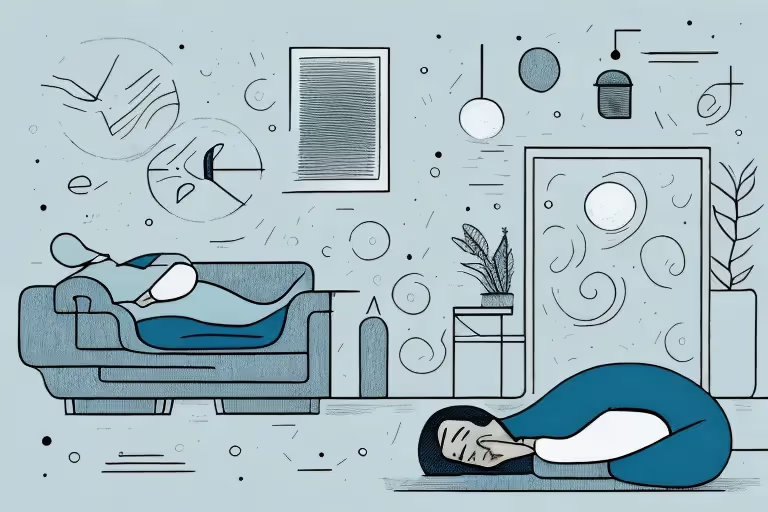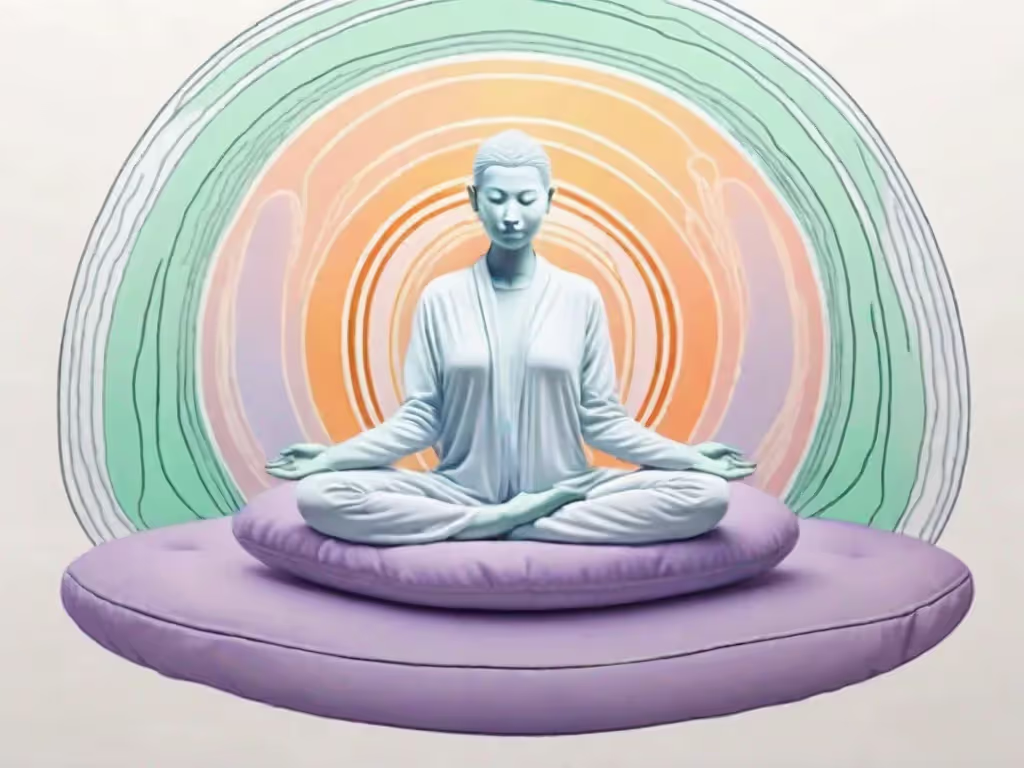Are you struggling with getting a good night's rest? Many people turn to medication or other sleep aids, but have you considered the power of music? Specifically, deep sleep music has been shown to provide numerous benefits for your overall health. In this article, we will explore what deep sleep music is, how it affects the brain, and the key benefits of incorporating it into your nightly routine.
Understanding Deep Sleep Music
What is Deep Sleep Music?
Deep sleep music is a genre of music specifically designed to help the listener relax and fall into a deeper sleep. It utilizes soothing sounds, such as white noise and slow instrumental music, to calm the body and mind. Unlike traditional music, deep sleep music is created with the intention of promoting relaxation and sleep.
Deep sleep music has been found to be particularly helpful for those who suffer from insomnia or other sleep disorders. The calming sounds can help to slow down racing thoughts and ease anxiety, allowing the listener to drift off into a peaceful slumber.
Different Types of Deep Sleep Music
There are various types of deep sleep music, ranging from classical music to nature sounds. Some popular examples include white noise, rain sounds, and piano music. Experimenting with different types can help you find the best sound that fits your personal preference.
Classical music has been found to be particularly effective in promoting deep sleep. The slow and steady pace of classical pieces can help to slow down the heart rate and breathing, leading to a more relaxed state.
Nature sounds, such as the sound of waves crashing or birds chirping, can also be effective in promoting deep sleep. These sounds can create a peaceful and calming environment, helping to reduce stress and anxiety.
In addition to traditional deep sleep music, there are also guided meditations and hypnosis recordings that can help to promote relaxation and sleep. These recordings often use a combination of soothing music and calming voiceovers to help the listener drift off into a peaceful slumber.
Overall, deep sleep music can be a helpful tool for those looking to improve their sleep quality. By experimenting with different types of music and finding what works best for you, you can create a peaceful and relaxing environment that promotes deep and restful sleep.
The Science Behind Deep Sleep Music
How Deep Sleep Music Affects the Brain
Studies have shown that listening to deep sleep music can slow down brainwaves, leading to a more relaxed state. Specifically, it can decrease the frequency of beta brain waves and increase the frequency of alpha and theta waves, which are associated with relaxation and sleep. Additionally, deep sleep music has been shown to increase the production of serotonin and melatonin, hormones that promote sleep.
It is important to note that not all music is created equal when it comes to promoting sleep. Deep sleep music typically features slow, calming rhythms and minimal lyrics, if any. This type of music can help create a peaceful and relaxing environment, which is conducive to falling asleep and staying asleep.
The Role of Brainwaves in Sleep
Understanding the role of brainwaves in sleep is important in understanding how deep sleep music can be effective. Beta waves are associated with alertness and wakefulness, while alpha and theta waves are associated with relaxation and sleep. Delta waves, which are even slower than theta waves, are associated with deep sleep.
During the different stages of sleep, our brainwaves naturally transition from beta to alpha and theta waves, and eventually to delta waves during deep sleep. However, factors such as stress, anxiety, and noise pollution can disrupt this natural process, leading to poor sleep quality.
This is where deep sleep music can be helpful. By slowing down beta waves and increasing alpha and theta waves, deep sleep music can ultimately help promote deep sleep and increase overall sleep quality. This is especially important for individuals who struggle with falling asleep or staying asleep throughout the night.
In addition to its effects on brainwaves, deep sleep music can also have a calming effect on the body. It can help reduce muscle tension and lower heart rate, which can further promote relaxation and sleep.
The Benefits of Deep Sleep Music
Aside from promoting better sleep, deep sleep music can also have other benefits for overall health and well-being. For example, it can help reduce stress and anxiety, which are common factors that can interfere with sleep. Additionally, it can improve mood and increase feelings of relaxation and calmness.
Deep sleep music can also be a useful tool for individuals who suffer from chronic pain or other medical conditions. By promoting relaxation and reducing stress, it can help alleviate symptoms and improve overall quality of life.
In conclusion, deep sleep music can be a powerful tool for promoting better sleep and improving overall health and well-being. By understanding its effects on brainwaves and the body, individuals can make informed decisions about incorporating it into their sleep routine.
Key Benefits of Listening to Deep Sleep Music
Improved Sleep Quality
One of the most significant benefits of listening to deep sleep music is improved sleep quality. By promoting relaxation and deeper sleep, deep sleep music can help reduce waking up throughout the night and ultimately lead to feeling more rested in the morning.
But did you know that improved sleep quality can have a ripple effect on your overall health and well-being? Studies have shown that individuals who consistently get a good night's sleep have a lower risk of developing chronic health conditions such as obesity, diabetes, and heart disease. They also tend to have better cognitive function and a more positive outlook on life.
Reduced Stress and Anxiety
In addition to improving sleep quality, deep sleep music has been shown to help reduce stress and anxiety. By promoting relaxation and calming the mind, it can help decrease the production of stress hormones and ultimately lead to feeling more at ease.
But stress and anxiety can have a significant impact on more than just our mental health. Chronic stress can lead to physical symptoms such as headaches, muscle tension, and digestive issues. By reducing stress through deep sleep music, we can help prevent these negative physical symptoms and promote overall physical health.
Enhanced Mental Health
Related to reducing stress and anxiety, deep sleep music has also been shown to have additional benefits for mental health. It can help decrease symptoms of depression and improve overall mood. It can also be a helpful tool for individuals with ADHD or other attention disorders, as it allows the mind to focus and relax.
But did you know that mental health is just as important as physical health? Neglecting our mental health can lead to a range of negative consequences, including difficulty with relationships, decreased productivity, and even physical health problems. By incorporating deep sleep music into our daily routine, we can help promote overall mental health and well-being.
Boosted Immune System
Believe it or not, listening to deep sleep music can also have a positive impact on your immune system. Stress can weaken the immune system, so by reducing stress through deep sleep music, you can help keep your immune system functioning properly. Additionally, deep sleep is when the body repairs and regenerates, so promoting deep sleep can also support overall immune system health.
But did you know that there are other ways to boost your immune system? Eating a healthy diet, staying hydrated, and exercising regularly can all help promote a healthy immune system. By incorporating these habits into our daily routine in addition to listening to deep sleep music, we can help support our overall health and well-being.
How to Incorporate Deep Sleep Music into Your Nightly Routine
Getting a good night's sleep is essential for our overall health and well-being. Unfortunately, many of us struggle with falling asleep or staying asleep throughout the night. One effective way to promote better sleep is by incorporating deep sleep music into your nightly routine. In this article, we will explore how to choose the right deep sleep music, set the ideal sleep environment, and combine deep sleep music with other relaxation techniques.
Choosing the Right Deep Sleep Music
Experimenting with different types of deep sleep music can help you find the sound that works best for you. A good starting point is to look for relaxing instrumental music or nature sounds, such as rain, waves, or birds. These sounds can help create a calming atmosphere that promotes relaxation and sleep. Consider making a playlist with your favorite tracks to listen to each night. This can help signal to your body that it is time to wind down and prepare for sleep.
Another option is to try binaural beats, which are specific sound frequencies that can help synchronize brain waves and promote relaxation. These beats can be found in many deep sleep music playlists and are often used in meditation and yoga practices.
Setting the Ideal Sleep Environment
In addition to deep sleep music, there are other environmental factors that can promote better sleep. Creating a comfortable sleep environment can significantly improve sleep quality. Start by making sure your bedroom is dark, quiet, and cool. Use blackout curtains or an eye mask to block out any light, and consider using earplugs or a white noise machine to block out any distracting sounds.
It is also important to have a comfortable mattress and pillows. Make sure your bedding is soft and cozy, and consider investing in high-quality sheets and blankets. Additionally, keeping your bedroom clean and clutter-free can help create a peaceful atmosphere that promotes relaxation.
Combining Deep Sleep Music with Other Relaxation Techniques
Deep sleep music can be even more effective when combined with other relaxation techniques, such as deep breathing or meditation. Consider practicing these techniques before bed while listening to your deep sleep music playlist. Deep breathing can help slow down your heart rate and calm your mind, while meditation can help you let go of any racing thoughts or worries that may be keeping you awake.
Another technique to try is progressive muscle relaxation, which involves tensing and then relaxing different muscle groups in your body. This can help release any tension or stress you may be holding onto and promote relaxation and sleep.
In conclusion, incorporating deep sleep music into your nightly routine can be a powerful tool for promoting better sleep and overall health. By choosing the right music, setting up a comfortable sleep environment, and combining deep sleep music with other relaxation techniques, you can create a bedtime routine that helps you unwind, relax, and get the restful sleep you need.
Incorporating deep sleep music into your nightly routine can provide numerous benefits for both your physical and mental health. By promoting relaxation and deeper sleep, it can ultimately lead to feeling more rested and alert during the day. Consider experimenting with different sounds and using it in combination with other relaxation techniques for optimal results. Sweet dreams!
Aura is Your All-In-One App for Meditation, Mindfulness & Wellbeing
Find peace every day with one app for your whole well-being. There is no one-size-fits-all solution to mental well-being. Aura is the first all-in-one wellness app that learns how to best help you.
Discover an endless library of expert-created tracks for your well-being, all taught by the world’s best coaches, therapists, and storytellers. With Aura's personalized recommendations, you can find peace every morning, day and night.



.webp)






.avif)

%20(1).avif)


.avif)
.avif)
.webp)


.avif)


















































































































.avif)

















.svg)









